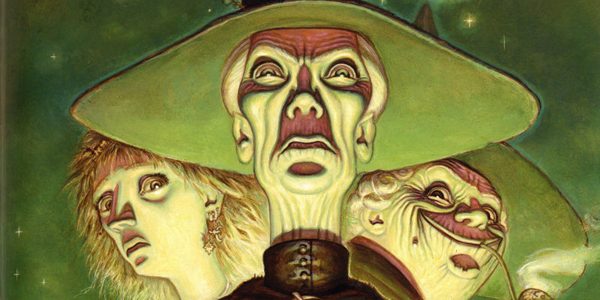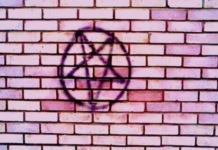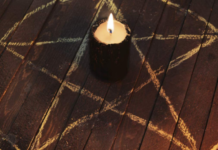 Sir Terry Pratchett’s comic fantasy series Discworld is a large-scale parody of Earth and human civilization. A flat world that sits on the backs of four elephants, who then stand on the back of a giant turtle who swims through space: this is the Discworld, where belief creates reality in the most literal sense. The world itself is the shape people have imagined it to be, and deities rise and fall in influence depending on how many people believe in them. There are witches and wizards on Discworld, and it’s the Discworld witches have influenced my own path as a witch.
Sir Terry Pratchett’s comic fantasy series Discworld is a large-scale parody of Earth and human civilization. A flat world that sits on the backs of four elephants, who then stand on the back of a giant turtle who swims through space: this is the Discworld, where belief creates reality in the most literal sense. The world itself is the shape people have imagined it to be, and deities rise and fall in influence depending on how many people believe in them. There are witches and wizards on Discworld, and it’s the Discworld witches have influenced my own path as a witch.
For better or worse, the Discworld witches are all female. In some ways, they fit the stereotypes of a fictional witch: pointy hats, wearing black, cackling. These witches self-aware about the cackling; the answer to “When shall we three meet again?” is simply, “Well, I can do next Tuesday.”
The witches of the Ramtop Mountains come in two flavours: young and headstrong, or old and cunning. The older and wiser they get, the more they function like a traditional village witch: serving their communities, dealing with matters of birth and death, and occasionally fending off otherworldly threats. Their magick is subtle and slow in contrast to the whizzbang, showy powers of the Discworld’s mostly-male wizards. Once a Discworld witch has matured past the phase of buying lots of occult jewellery in hopes that it will give her power, she may explore the practice of headology, a kind of psychology that rests on what the patients believe about reality.
Making use of Discworld’s magick
Headology is a folksy-sound word that combines psychology, ritual, and compassionate trickery. In the novel Maskerade, one of Discworld’s oldest, wisest, and more acerbic witches, Granny Weatherwax, cures a man’s backache using headology.
When the man comes to her cabin, she gives him a special potion.
“This is a potion of rare herbs and suchlike,” she said. “Including sucrose and akwa.” […] She’d long ago been resigned to the fact that people expects a bottle of something funny-colored and sticky. It wasn’t the medicine that did the trick, though. It was, in a way, the spoon.
Then she describes a ritual: walk three times around a chestnut tree and sleep with a pine board under his bed.
“So’s the knots in my back end up in the pine?” he hazarded.
Granny was impressed. It was an outrageously ingenious bit of folk hokum worth remembering for another occasion.
“You got it exactly right,” she said.
On his way out of the door, Granny “slips” and thrusts a strategically chiropractic knee in the man’s back. Lo and behold, his backache is feeling better already, even as he leaves to complete the ritual. Two parts headology, one part chiropractic adjustment. Would the cure have worked without the knee in the back? Or the potion? or the ritual? Perhaps one element could have been removed, but the cure was most effective with all three.

Changing consciousness at will
When Granny describes headology to younger witches, they often finds it frustrating or consider it cheating because it isn’t a formal ritual or an overt display of magical power. But the power of headology is revealed repeatedly.
On the Discworld, a place where the laws of physics are mere guidelines and magick is the major connective force of the world, the most powerful witches choose to use fantasy magick sparingly, or not at all. The magick they’re using bears a striking resemblance to the magick that witches use here, on Earth. The Discworld witches are tapping into a universal quality of magick that extends beyond the realm of fiction.
Dion Fortune defines magick as “the art of changing consciousness at will.” In the previous example, the ritual trappings of the backache cure were to help the patient change his own consciousness. Granny isn’t exactly tricking a foolish peasant man. She really is helping the man with what ailed him, just in a roundabout way. Part of the magick is in his own mind, but it is facilitated by the will of the witch.
Sometimes we need to trick our brains into healing or positive change. To do that, a strong magical will is required. In The Spiral Dance, Starhawk talks about magical will as stemming from your ability to be “scrupulously honest” in your personal life: you must keep your own promises so that you know your word means something powerful. Granny Weatherwax’s strength of character, including establishing herself as a terrifying old witch who is not to be crossed, gives her vast power to exert her own will in her world.
Bringing Discworld’s magick to life
In my own identity as a witch and my own practice of witchcraft, I think a lot about the Discworld witches. For one thing, I try to cultivate my own magical will in the same way they do, through honesty, service, and a strategic use of ritual. The Discworld witches are not fancy and live simple lives. They function as community builders and caretakers, all without losing their iron sense of self. And that’s something I look up to.
As for headology, I use it in my own practices. When I write and perform rituals, I choose things that I can have strong magical will about because I understand them well: the tarot, fairy tales, and Celtic cosmology, in my case. I am an analytical person by nature, and I know that anything I haven’t understood on an intellectual level won’t have as much of an impact on me in a ritual sense.
I bring the magick when it comes to fairy tales. But astrology? I’m not very knowledgeable or passionate about the subject, so I leave it alone. Does that mean that astrology “doesn’t work” for me? No, but that means that for me to incorporate astrology into a ritual, I need to work with someone who can bring their own headology surrounding it. Headology is more than simply belief; rather, it is the ability to bring one’s magical will to action.
Perhaps it is ironic, that the fictional creations of a humanist, atheist author have affected my spiritual development so much. But whether or not he meant to, Sir Terry Pratchett left a magical legacy behind him. Sadly, the man himself died in 2015, but the echoes of him live on in the lives of myself and many other witches.
If you’d like to get a taste of Sir Terry Pratchett’s witches for yourself, check out the Discworld books. Wyrd Sisters, Witches Abroad, and The Wee Free Men are three fantastic places to start.








